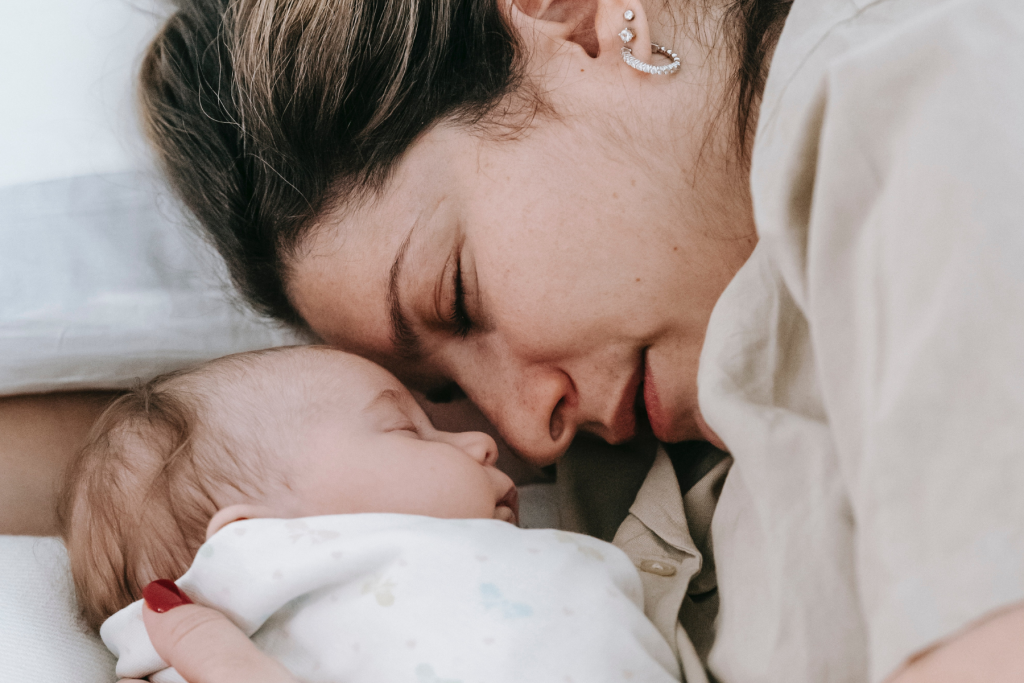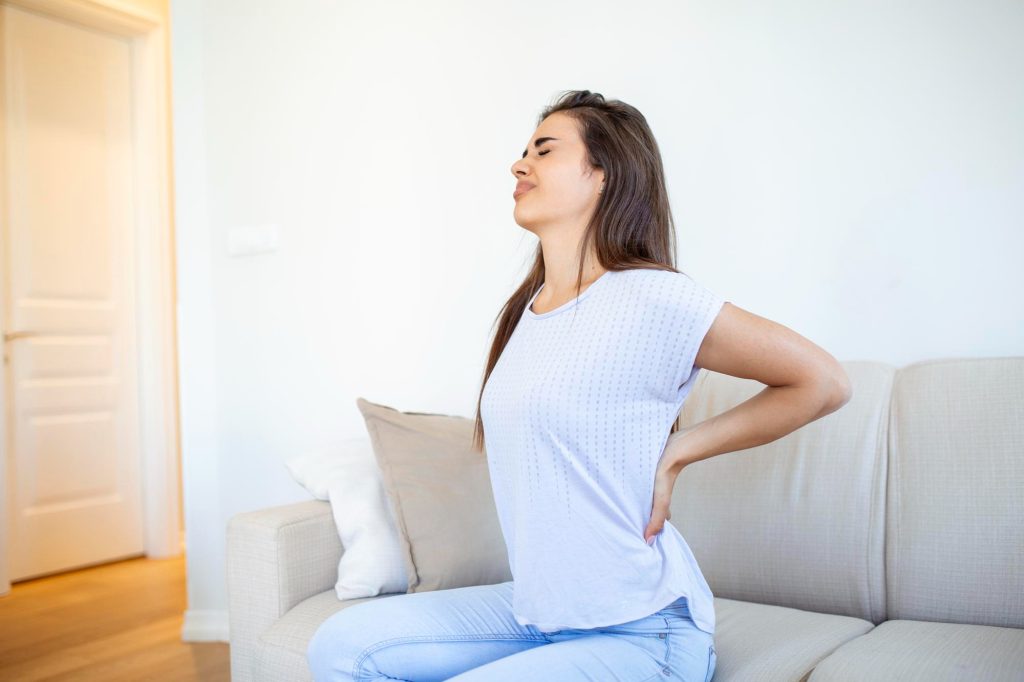Discover the best sleeping positions to alleviate postpartum back pain and promote a restful night’s sleep.
Optimal Sleeping Positions for Postpartum Back Pain Relief

Everyone knows that getting enough sleep is important for overall health and well-being. But for new moms experiencing postpartum back pain, getting a good night’s sleep can be challenging. Luckily, there are optimal sleeping positions that can help alleviate back pain and promote healing during this delicate time. In this article, we will explore the causes and duration of postpartum back pain, the importance of sleep for recovery, optimal sleeping positions, additional tips for pain relief, and when to seek medical help.
Understanding Postpartum Back Pain
Postpartum back pain is a common issue that many new moms face. It can be caused by factors such as hormonal changes, muscle strain from pregnancy, and the stress placed on the body during childbirth. The pain can range from mild to severe and can last for varying durations.
During pregnancy, a woman’s body undergoes numerous physical changes to accommodate the growing baby. These changes, such as weight gain and a shift in the center of gravity, can put strain on the back muscles. As the baby grows, the uterus expands and pushes against the spine, causing additional pressure on the back. This increased load can lead to muscle strain and discomfort.
In addition to the physical changes, hormonal fluctuations also play a role in postpartum back pain. The hormone relaxin, which is released during pregnancy, helps to loosen the ligaments and joints in preparation for childbirth. While this is necessary for the birthing process, it can also contribute to increased flexibility in the back, leading to instability and pain.
The act of childbirth itself can also put significant stress on the spine. The intense contractions and pushing exertion can cause soreness and discomfort in the back. The position in which a woman gives birth, such as lying on her back or squatting, can also impact the strain placed on the back muscles and spine.
Causes of Postpartum Back Pain
There are several potential causes of postpartum back pain. The physical changes that occur during pregnancy, such as weight gain and a shift in the center of gravity, can put strain on the back muscles. Hormonal changes, specifically the hormone relaxin, can also contribute to increased flexibility in the ligaments and joints, leading to instability and pain. Additionally, the act of childbirth itself can put significant stress on the spine, causing soreness and discomfort.
Aside from the immediate postpartum period, the demands of caring for a newborn can also contribute to back pain. Constantly lifting and carrying the baby, bending over to change diapers, and breastfeeding in awkward positions can all strain the back muscles and exacerbate any existing pain.
Duration and Severity of Postpartum Back Pain
The duration and severity of postpartum back pain can vary from woman to woman. Some may experience only mild discomfort that subsides within a few weeks, while others may have more severe and chronic pain that persists for several months. It’s important to keep in mind that each woman’s experience is unique, and seeking proper medical guidance is essential if the pain becomes unbearable or interferes with daily activities.
In most cases, postpartum back pain gradually improves as the body recovers from pregnancy and childbirth. Engaging in gentle exercises, such as walking or swimming, can help strengthen the back muscles and alleviate pain. Physical therapy and chiropractic care may also be beneficial in managing and treating postpartum back pain.
It’s important for new moms to prioritize self-care and listen to their bodies. Resting when needed, using proper body mechanics when lifting or carrying the baby, and seeking support from healthcare professionals can all contribute to a smoother recovery from postpartum back pain.
The Importance of Sleep for Postpartum Recovery
Getting enough sleep is crucial for postpartum recovery. Sleep plays a vital role in healing and repairing the body. During sleep, our bodies produce growth hormones that promote tissue rejuvenation, reduce inflammation, and help alleviate pain. Furthermore, proper sleep can aid in regulating mood, reducing stress levels, and promoting overall well-being.
One of the key benefits of sleep for postpartum recovery is its ability to support the body’s healing process. When we sleep, our bodies have the opportunity to repair and regenerate. This is particularly important for new moms recovering from childbirth and dealing with the physical demands of caring for a newborn. By prioritizing sleep, moms can enhance their body’s ability to heal, allowing them to recover more quickly and effectively.
Moreover, sleep deprivation can have a profound effect on postpartum women. Lack of sleep can exacerbate pain, increase stress levels, and contribute to feelings of fatigue and overwhelm. It can also affect cognitive function, making it more challenging to perform everyday tasks and care for a newborn. By making sleep a priority, new moms can better manage postpartum challenges and regain a sense of balance and well-being.
Aside from its physical benefits, sleep also plays a crucial role in mental health. Postpartum women often experience hormonal fluctuations and emotional changes, which can be further exacerbated by sleep deprivation. Getting enough sleep can help regulate mood, reduce anxiety and depression symptoms, and improve overall mental well-being.
Furthermore, quality sleep is essential for breastfeeding mothers. Breast milk production is influenced by various factors, including adequate rest. When a new mom gets enough sleep, her body can produce and maintain an adequate milk supply, ensuring that her baby receives the necessary nutrients for healthy growth and development.
It is important to note that prioritizing sleep as a new mom can be challenging. The demands of caring for a newborn, coupled with hormonal changes and adjusting to a new routine, can make it difficult to achieve sufficient rest. However, by establishing a consistent sleep schedule, creating a sleep-friendly environment, and seeking support from partners and loved ones, postpartum women can improve their sleep quality and duration.
In conclusion, sleep is a vital component of postpartum recovery. It supports the body’s healing process, helps regulate mood, reduces stress levels, and promotes overall well-being. By recognizing the importance of sleep and making it a priority, new moms can enhance their recovery, better manage postpartum challenges, and ultimately thrive in their role as caregivers.
Exploring Optimal Sleeping Positions
Choosing the right sleeping positions can make a world of difference for postpartum back pain relief. Not only can the right position alleviate discomfort, but it can also promote better sleep quality and overall well-being. Here are some positions to consider:
Sleeping Positions to Alleviate Back Pain
1. Sidelying position: Lie on your side with a pillow between your knees and another pillow to support your abdomen. This position helps align the spine and relieves pressure on the lower back. By keeping your spine in a neutral position, you can reduce strain on the muscles and ligaments surrounding the spine, allowing for better relaxation and pain relief.
Additionally, placing a pillow under your head can help maintain proper alignment of the neck, preventing any unnecessary strain or discomfort. This position is especially beneficial for individuals who experience sciatica or hip pain, as it helps alleviate pressure on these areas.
2. Semi-reclined position: Use a reclining chair or prop yourself up with pillows to achieve a slightly elevated position. This can help alleviate strain on the back and provide support. By reclining, you allow gravity to assist in keeping your spine in a more natural alignment, reducing the risk of excessive pressure on the lower back.
Furthermore, this position can be particularly helpful for individuals who suffer from acid reflux or heartburn, as it helps prevent stomach acid from flowing back into the esophagus. By keeping your upper body elevated, you can enjoy a more comfortable and uninterrupted sleep.
3. Pillow under the knees: Place a pillow under your knees while lying on your back. This helps maintain the natural curvature of the spine and reduces stress on the lower back. By elevating your knees slightly, you relieve pressure on the lumbar region, allowing the muscles and ligaments to relax more effectively.
Moreover, this position can improve circulation, as it helps prevent blood from pooling in the legs and feet. By promoting better blood flow, you can wake up feeling more refreshed and energized.
Sleeping Positions to Avoid
While certain positions can help alleviate back pain, there are also positions that should be avoided:
1. Sleeping on your stomach: This position can strain the neck, lower back, and pelvis, exacerbating pain and discomfort. When you sleep on your stomach, your spine is forced into an unnatural position, causing unnecessary stress on the muscles and ligaments. This can lead to morning stiffness and increased pain throughout the day.
Additionally, sleeping on your stomach can also put pressure on your internal organs, potentially affecting digestion and overall organ function. It is best to avoid this position if you are experiencing back pain or looking to prevent it.
2. Flat on your back: Lying flat on your back can put pressure on the spine and aggravate back pain. It can also lead to snoring and potentially interfere with breathing. When you sleep on your back without any support, your spine may not maintain its natural curvature, leading to strain and discomfort.
Furthermore, this position can worsen sleep apnea symptoms, as the airway may become partially blocked due to the collapse of soft tissues at the back of the throat. If you find that sleeping on your back exacerbates your back pain or breathing difficulties, it is advisable to try alternative sleeping positions.
By understanding the importance of proper sleeping positions and making small adjustments, you can significantly improve your sleep quality and alleviate back pain. Experiment with different positions and find what works best for your individual needs. Remember, a good night’s sleep is essential for your overall health and well-being.
Additional Tips for Postpartum Back Pain Relief
In addition to optimizing your sleeping positions, there are other strategies you can incorporate into your routine to further relieve postpartum back pain:

Incorporating Gentle Exercise into Your Routine
Engaging in gentle exercises, such as walking, yoga, or swimming, can help strengthen the muscles that support your back and alleviate pain. It’s crucial to consult with your healthcare provider before starting any exercise regimen and to listen to your body throughout the process.
The Role of Nutrition in Back Pain Relief
Eating a nutritious diet can also contribute to pain relief and overall well-being. Focus on consuming foods rich in anti-inflammatory properties, such as fruits, vegetables, and healthy fats. Staying hydrated is equally important for maintaining optimal spinal health.
When to Seek Medical Help
While many cases of postpartum back pain can be managed with self-care strategies, there are situations where seeking medical help is necessary:
Signs Your Back Pain Needs Medical Attention
If you experience any of the following symptoms, it’s advisable to consult a healthcare professional:
1. Severe and unrelenting pain that worsens over time
2. Pain accompanied by neurological symptoms such as numbness, tingling, or weakness
3. Difficulty controlling bowel or bladder
Treatment Options for Persistent Postpartum Back Pain
If postpartum back pain persists despite self-care efforts, your healthcare provider may recommend additional treatment options. These may include physical therapy, chiropractic care, or in some cases, medication or injections to manage pain and promote healing.
In conclusion, finding the optimal sleeping positions can significantly contribute to postpartum back pain relief and promote healing during this crucial time. By understanding the causes and duration of postpartum back pain, recognizing the importance of sleep for recovery, exploring optimal sleeping positions, adopting additional pain relief strategies, and knowing when to seek medical help, new moms can take proactive steps towards relieving back pain and achieving overall well-being



